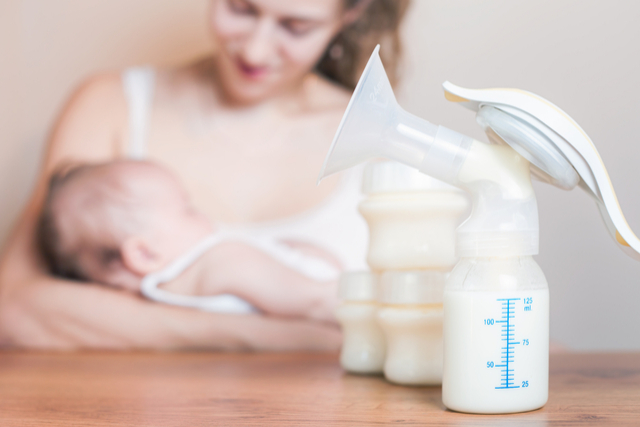Breastfeeding: Frequently Asked Questions
1. What do I need to do to prepare for breastfeeding?
You can read up on information about various position for breastfeeding which can help your baby to latch properly. If your baby is not properly latched onto your breast, breastfeeding can be painful for nursing mothers and “irritating” for the newborn.
Furthermore, expecting mothers should familiarize themselves with terms like “colostrum”, milk “come in”, “breastfeeding on demand” and “exclusive breastfeeding”.
Lastly, you can buy useful tools to help with breastfeeding. The tools can include nursing pad, nursing cover, nursing pillow and breast pump.
2. How is breastmilk different from infant formula?
Firstly, breastmilk has greater nutritional value than infant formula. A good indication of this is that a breastfed baby will usually stool less often as there is very little solid waste to be eliminated from the breastmilk as compared to formula milk.
Breastmilk also contains the mother's antibodies which are transferred to the infant and help to protect the newborn from the bacteria and viruses. The presence of anti-inflammatory agents in breastmilk also helps to regulate the body's immune system response against infection. The bifidus factor in breastmilk encourages the growth of Lactobacillus factor, a beneficial bacteria that prevents the growth of harmful organisms in a breastfed baby's digestive tract.
Human milk straight from the breast is always clean, and is never contaminated by polluted water or dirty bottles, which can lead to diarrhea in the infant.
3. Should breastfeeding hurt?
Some nursing mothers may experience some tenderness during the first few days of breastfeeding. This pain should fade away over time.
Pain can be caused by the baby being poorly latched onto the breast or an infection like thrush. Pain during breastfeeding can be overcome and it is important to seek help as early as possible to resolve the problem.
4. What is colostrum?
Colostrum is the first milk which is produced in the first few days after childbirth. It is yellow to orange in color, thick and sticky.
Its composition is very different from mature breastmilk and it provides perfect nutrition tailored to the newborn. It is rich in antibodies which act to protect the newborn against disease and infection. It also has a higher protein content than mature breastmilk. Colostrum is also rich in minerals and vitamins A and D.
5. When will my milk 'come in'?
For the first few days after your baby’s birth, your body will produce colostrum which is a “pre-milk” that provides perfect nutrition for your baby.
Timing for the milk ‘come in’ depends on your baby's ability to properly latch onto your breast and how frequently and effectively your baby sucks. Generally, a mother's milk tends to 'come in' between the 3rd and 4th day after delivery.
6. What should be the frequency and duration of breastfeeding?
It is recommended that you practice breastfeeding on demand which means you feed your baby whenever he or she is hungry.
As a guideline, in the first 2 months, you should breastfeed your baby 8 to 12 times a day. From 2 months to 6 months, you should breastfeed for 6 times or more a day. When your baby is between 6 months to 12 months, you should breastfeed 3 to 5 times a day.
You can refer to details here: How Often To Breastfeed: Frequency And Duration
For each session, the duration should range from 15 minutes to 45 minutes.
7. Is breastmilk alone sufficient to meet my baby's nutritional needs?
The exact composition of breastmilk change to adapt to your baby’s nutrition needs as he or she grows. The World Health Organization (WHO) recommends exclusive breastfeeding for newborns in the first six months. Breastmilk can be fed to the baby for the first six months and up to two years of age and beyond as desired by the mother and child. Exclusive breastfeeding means that there is no need for other liquids such as water or foods during the first six months, and even after solid foods are introduced after the 6th month, breastmilk can be given as the main milk drink.
8. What diet should I follow while breastfeeding?
A well-balanced diet similar to the one you consumed during pregnancy is all you need. Drink water or other beverages according to thirst.
9. Is there any special diet to increase breastmilk production?
Traditional foods such as unripe papaya cooked with fish have been advocated to increase mother's milk.
Fenugreek, also known as 'venthaiyem' (in Tamil), 'methi' (in Hindi) or 'Halbal (in Malay), is the herb that is commonly used in cooking curry has been used traditionally to increase milk supply.
Oatmeal, salmon and sesame have been found to increase breast milk supply by some mothers.
10. How do I know my baby is getting enough milk?
|
Weight gain |
Wet diaper |
Soiled diaper |
|
Lose 7% of weight in first 3 days and gain 20 to 35 grams every day thereafter. |
At least 1 in first day, 2 in second day and 3 to 6 from day 3 to day 7. |
At least 1 in first two days and at least 3 from day 3 to day 7. |
|
170 grams per week |
About 6 wet diapers a day |
3 to 4 dirty diapers. However, some babies may pass stool much less often like once in every 7 days. |
|
120 to 160 grams per week |
About 6 wet diapers a day |
About 3 dirty diapers a day. However, some babies may pass stool much less often like once in every 7 days. |
|
60 to 110 grams per week |
5 to 6 wet diapers a day |
About 1 dirty diaper per day. However, some babies may pass stool much less often like once in every 7 days. |
11. How can I breastfeed without exposing myself?
You can choose to use a nursing cover when you breastfeed outside. Alternatively, you can breastfeed your child in nursing rooms when you go out. You can use our directory Nursing Rooms in Singapore to plan your breastfeeding sessions away from home.
You can also consider wearing a two-piece outfit and pulling the shirt up from the waist. Drape a burp cloth or receiving blanket over your shoulder for greater coverage.
12. What's in it for me and the baby?
Breastfeeding has many benefits for both nursing mothers and the breastfed baby. Your baby will be more intelligent, healthier and less likely to be allergic. As for the nursing mother, you will less likely experience breast, ovarian and cervical cancers and is able to get back in shape faster.
13. Can I breastfeed if I'm not large breasted?
Yes! Size has nothing to do with milk production.
14. Won't I have to give up eating the foods I enjoy?
Not at all. Just eat a well-balanced diet, and you may wish to continue taking your prenatal vitamins while breastfeeding.
If the baby’s father has allergy to certain food(s), you may want to eliminate these foods from your diet.
15. Should I avoid coffee while breastfeeding?
No. It is safe to have coffee in moderation unless you are instructed not to drink coffee by your doctor.
It takes a village to raise a child !
Join our WhatsApp Parenting Chat Groups By Area in Singapore.









